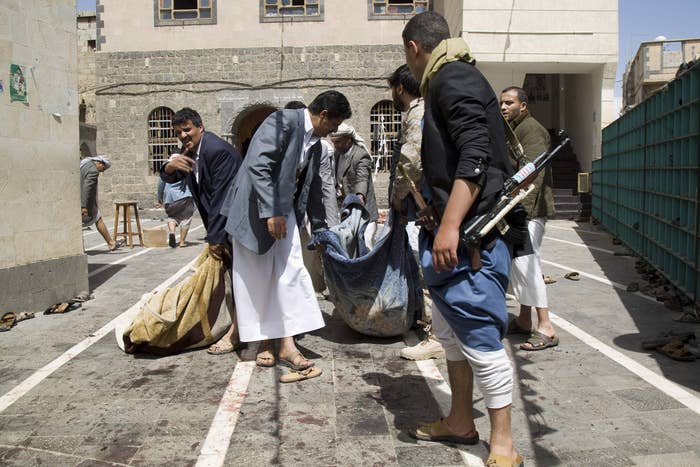
ISTANBUL — During the last 48 hours, Yemen may have passed the point of peaceful return. On Thursday, forces loyal to the country's last two presidents battled for control of the international airport in Aden, a southern port city.
And on Friday, 270 miles north of that bloody confrontation, two pairs of suicide bombers entered separate Zaydi-Shia mosques in the capital of Sanaa and detonated their explosives, killing at least 46, according to early reports.
Yemen has been disintegrating for months, and these latest clashes may finally tip the country into what many fear will be a brutal and multisided civil war as sectarian lines harden and politics becomes more deadly.
Two months ago in Sanaa, Yemen's official capital, President Abdu Rabu Mansur Hadi, who came to power on the heels of months of popular protests in 2011 and 2012, submitted his resignation under pressure from a Zaydi militia group known as the Huthis. Hadi remained under house arrest for weeks before escaping to Aden in February, where he rescinded his resignation and met with foreign officials such as US Ambassador Matthew Tueller.
The Huthis tried and largely failed to assert their control over the government. At the same time, Yemen's other former president, Ali Abdullah Salih, who had ruled for 34 years before being forced out in 2012, attempted to regain some of the control he lost during the Arab Spring. Salih had remained in the country as part of an immunity deal overseen by the U.S. and Saudi Arabia. That deal now appears to have been a mistake.
The bloody jockeying for power and territory spilled over on Thursday, when Hadi attempted to dismiss the head of the Special Security Forces in Aden, who remained loyal to Salih.
The fighting closed the airport for hours, canceling flights including one carrying the Associated Press correspondent Hamza Hendawi, who filed this report. Hadi's forces, which included southern tribal fighters, eventually gained control of the airport. Either Salih or the Huthis responded by dispatching fighter jets from Sanaa, which bombed at least one building in the compound where Hadi was staying.
Hadi announced that he had survived four assassination attempts in recent days, and took to his Facebook page to issue orders to any military units in Sanaa who might remain loyal to him.
For many Yemenis, the fighting between competing presidents in Sanaa and Aden brings back bitter memories of 1994, when the country fought a brief but bloody civil war. Salih, the northerner, was victorious that time, defeating his southern opponent. But Salih also relied on Hadi, a southerner, whom he brought into the government as his vice president.
This time the two are on opposite sides, and Yemen is no longer a simple binary conflict. The war that is emerging today is messy and multisided. Salih is fighting Hadi, who is fighting the Huthis, who are fighting al-Qaeda. And that makes for a much more dangerous situation.
Indeed, Friday's mosque attacks appear to be either the work of al-Qaeda or ISIS supporters in Yemen, and look like an attempt to spark the sort of Shia-Sunni sectarian war that has engulfed Iraq. The Huthis and al-Qaeda have been engaged in a running guerrilla war for years. But today's attacks, if claimed by al-Qaeda or ISIS, would be a significant escalation.
Individually, each of Yemen's two overlapping wars — sectarian and political — would be severe enough to cripple the country. Together they might just kill off any lingering hopes of unity.
